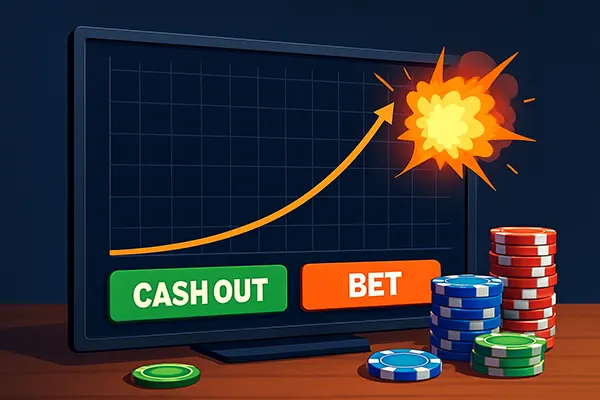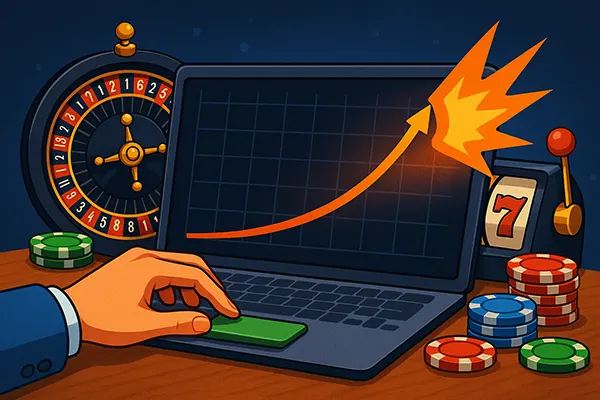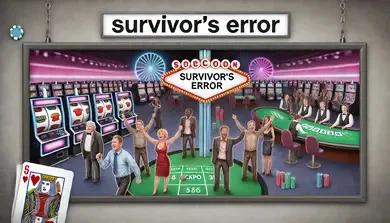
Crash Games: Why Players Are Shifting from Slots to Dynamic Betting
In the past few years, a noticeable trend has emerged in online gambling: players are increasingly abandoning traditional slots in favour of crash games. This transformation is driven by the need for more control, instant results, and an adrenaline rush unmatched by most slot machines. As of June 2025, crash games have firmly established themselves as one of the leading formats in online betting, drawing in both experienced gamblers and curious newcomers.
What Are Crash Games and Why Are They So Popular?
Crash games are simple yet captivating betting games where a multiplier increases over time, and the player must cash out before it crashes. This seemingly straightforward concept hides a psychological depth that keeps users engaged. Players control when to exit the game, and this sense of agency dramatically enhances the thrill compared to static slot spins.
The simplicity of gameplay contributes to its mass appeal. There’s no need to memorise paylines or bonus mechanics — the objective is clear and direct. Additionally, the real-time element creates a sense of community, as many crash games display other players’ actions live, generating a shared experience similar to multiplayer gaming.
Moreover, crash games align well with mobile-first design. Their minimalistic interface and fast-paced sessions make them ideal for on-the-go play. As mobile usage continues to dominate, crash games naturally become more accessible and attractive than traditional slot titles.
How the Betting Industry Is Adapting to the Crash Trend
Operators are quickly responding to player interest by investing in crash-style game development. Studios like Spribe (creators of “Aviator”) have set benchmarks for the genre, and other providers now follow suit, pushing innovation to capture the same momentum. These games are now a staple in most online betting services that aim to stay competitive in 2025.
The growth of this genre also signals a shift in marketing strategies. Instead of highlighting jackpots or spinning reels, promotions now focus on cashout timing, fast rounds, and streamer-style excitement. Influencer partnerships further reinforce the game’s image among younger players, who prioritise skill and timing over chance.
Furthermore, the demand for transparency has led developers to integrate provably fair mechanics, especially in blockchain-based betting sites. These features give players additional reassurance that the outcomes are not manipulated, thereby fostering trust and loyalty.
Player Psychology: Why Crash Games Appeal More Than Slots
The psychological core of crash games lies in loss aversion and risk control. Unlike slot machines, where the outcome is predetermined, crash games offer the illusion of influence. Players feel they can beat the system with the right timing, which creates a more involved experience.
The pacing of crash games also aligns with modern attention spans. Each round lasts only a few seconds, offering rapid gratification or loss, followed by a quick restart. This loop is addictive but also provides opportunities to stop, reflect, and adapt strategies, unlike long slot sessions that rely on passive play.
Another important factor is social proof. Seeing others win — or crash — adds urgency and excitement. Leaderboards, shared winnings, and live cashouts build an environment of constant engagement, which keeps players coming back more frequently than they would for solitary slot spins.
Risk and Regulation in the Crash Game Space
As crash games grow in popularity, regulators have started to pay closer attention. The UK Gambling Commission and other European bodies are evaluating how these games align with existing consumer protection laws. In particular, the real-time nature of these games raises concerns around impulse control and responsible gambling.
To mitigate risks, operators now integrate features like customizable limits, reality checks, and educational prompts. Some services even offer “demo” or “free mode” crash games to encourage responsible trial without financial exposure. These features are expected to become standard in regulated markets throughout 2025.
Nevertheless, the unregulated segment remains vast. Offshore services often bypass responsible gambling standards, making user education and international cooperation crucial in maintaining a balanced environment for safe betting habits.

Crash Games in 2025: Technological Advancements and Future Outlook
The crash format is evolving rapidly, with AI-powered prediction tools and enhanced visualisations making their way into mainstream offerings. Some platforms now allow players to apply automated cashout scripts or pattern recognition systems, appealing to tech-savvy gamblers looking to fine-tune their risk management.
Virtual reality (VR) experiments are also underway. Though still in the early stages, immersive crash environments aim to merge gaming and betting, especially for Gen Z users who expect high interactivity and entertainment value from online services. These changes reflect a broader trend of gamification in betting, where participation feels more like a game than a wager.
Looking ahead, crash games are not expected to replace slots entirely, but they will continue to gain ground. Their flexibility, speed, and simplicity align well with current user expectations and technology trends. For developers and operators, ignoring this format is no longer an option.
Summary: Why the Shift Is Here to Stay
Crash games meet the demand for faster, more engaging, and player-controlled experiences in the online betting world. Their surge in popularity is not a passing trend but a reflection of changing player preferences. The combination of simplicity and control makes them a powerful alternative to traditional slot games.
With increasing regulatory scrutiny, improved responsible gambling features, and innovation in both gameplay and presentation, crash games are positioned as a sustainable growth area in 2025. They offer an environment where skill, timing, and excitement merge — something static slots have struggled to provide in recent years.
For players, crash games represent a modern, community-driven, and adaptive form of entertainment. For the industry, they mark a new phase of evolution that balances risk and thrill in a highly accessible format.
Lignende artikler
-
 Systematic Mistake of a Gambling Survivor
Systematic Mistake of a Gambling SurvivorOnline gambling, especially on platforms like Casino Go, has gained …
-
 Review of Fishin’ Pots of Gold: Gold Blitz Slot by Gameburger St...
Review of Fishin’ Pots of Gold: Gold Blitz Slot by Gameburger St...If you’re looking for a unique and entertaining slot game, …
